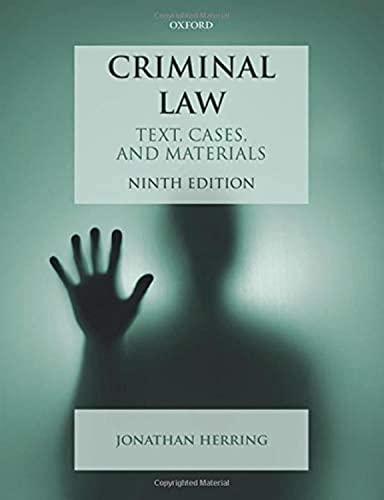Question
Officers arrest Fred and advise him of his Miranda rights. Fred understands his rights and verbally waives them. After 20 minutes of questioning, officers figure
Officers arrest Fred and advise him of his Miranda rights. Fred understands his rights and verbally waives them. After 20 minutes of questioning, officers figure out that Fred is lying to them and so they tell Fred they will call the local Social Services office and have Fred's children taken away if Fred doesn't confess. Thereafter, Fred confesses. Was this confession obtained in violation of the 5th Amendment?
a. No, because Fred was given and waived his Miranda rights.
b. No, because Fred was not entitled to receive Miranda warnings.
c. Yes, because the statement was coerced.
d. Yes, because Fred didn't waive his Miranda rights in writing.
1. I believe that the correct answer is C. The confession obtained from Fred violated his Fifth Amendment right. The confession was coerced by the officers. Even though Fred waived his Miranda right to remain silent, this doesn't give the officers the right to trick him into a confession. The Fifth Amendment guarantees the right to a grand jury, forbids "double jeopardy," and protects against self-incrimination. This means that the Fifth Amendment protected Fred from self-incrimination. The officers figured out that Fred was lying to them and felt that it was necessary to get the truth by any means necessary. They figured out that Fred's weakness was his children and they proceeded to use it against him to force a confession. The officers told Fred that his children would be taken away by social services unless he confessed his crimes. After learning that this might be a possibility, Fred confessed. Most parents would confess to protect their children. The problem with this is that the officers used Fred's children as leverage against him. Fred's statement was not voluntary, he did not freely or deliberately offer his confession. In Spano v. New York, voluntariness was discussed. The due process clause requires that confessions be voluntary. In Spano v. New York, the suspect was interrogated by police officers. The suspect refused to confess and even asked for his attorney. The police officers grew impatient so they used the defendant's childhood friend who had become a police officer. The childhood friend told the defendant that his job was in jeopardy and that this would have a terrible effect on his family. The defendant finally confessed. This confession was also coerced. They used the defendant's family as leverage. This further supports Fred's case. Both statements received from the suspects were coerced and not voluntary, regardless of whether or not the Miranda Rights were waived.
reply to the comment above.
2. I think the answer is C. In order for a defendant to waive their Miranda Rights, they must do so voluntarily, knowingly, and intelligently. Voluntarily waiving the Miranda Rights, means that after a defendant is given them, the defendant willingly and without any coercion, relinquishes their right. Knowingly and intelligently mean that, the defendant has no mental condition affecting the way they are thinking and understands the rights that are given to them. A defendant who meets all three of those requirements is allowed to waive their Miranda Rights. Fred voluntarily waives his rights after the officers told him his rights. Fred meets all three requirements so, he is able to waive his Miranda Rights. However, even if Fred is lying, the officers can not coerce him into telling the truth. The officers threatened Fred by telling him they would take away his kids. If Fred had confessed after waiving his rights and without the officers threatening him, then the confession would've been admissible. This is because when a defendant waives their Miranda Rights they are waiving their Fifth Amendment right to self-incrimination. Meaning, a defendant is not self-incriminating themselves after they have waived their Miranda Rights. However, in Fred's case, he was coerced into telling the truth which makes his confession inadmissible. In Brown v. Mississippi, the Court found that officers physically torturing a defendant makes the confession invalid because the confession is not by free choice of the defendant. Although Fred waived his Miranda Rights, the officers are not allowed to coerce him into a confession because the confession was given against his own free will.
reply to the comment above.
Step by Step Solution
There are 3 Steps involved in it
Step: 1

Get Instant Access to Expert-Tailored Solutions
See step-by-step solutions with expert insights and AI powered tools for academic success
Step: 2

Step: 3

Ace Your Homework with AI
Get the answers you need in no time with our AI-driven, step-by-step assistance
Get Started


